1. Team awards recognize the collective efforts and achievements of groups of employees, promoting teamwork, collaboration, and alignment with business goals.
2. These awards can strengthen relationships, build mutual trust, and enhance the work environment.
3. Best practices for Team awards include choosing team recognition over individual awards, ensuring fairness, rewarding project and cross-functional teams, and creating visibility for the awards.
4. They can significantly boost employee morale and business growth if implemented effectively.
Team awards are one type of recognition often offered by organizations. They are significant because they aim to recognize a group of employees’ collective efforts and achievements rather than those of individual employees.

A Team Award is usually given to a group of employees working together as a unit to accomplish common business objectives.
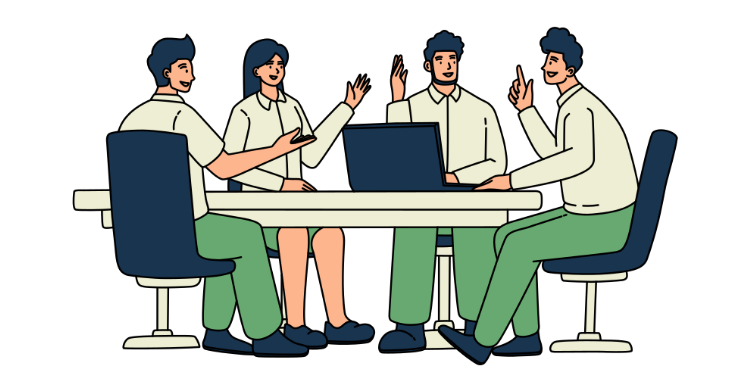
Team awards are typically given to recognize outstanding performance, collaboration, innovation, and achievement within a group or team setting.
Typical situations for giving team recognition include
It acknowledges teams that have met or exceeded specific goals or targets, whether sales targets, customer acquisition, production quotas, quality scores, customer service, or other performance metrics.
Recognizing teams that have completed a project on time, within budget, and with exceptional results.
Awarding cross-functional teams or work groups can be a powerful way to recognize collaboration, innovation, and successful outcomes across different departments or functional areas within an organization.
These situations allow organizations to celebrate teamwork, boost morale, and reinforce desired behaviors and values within the team and the broader organization.
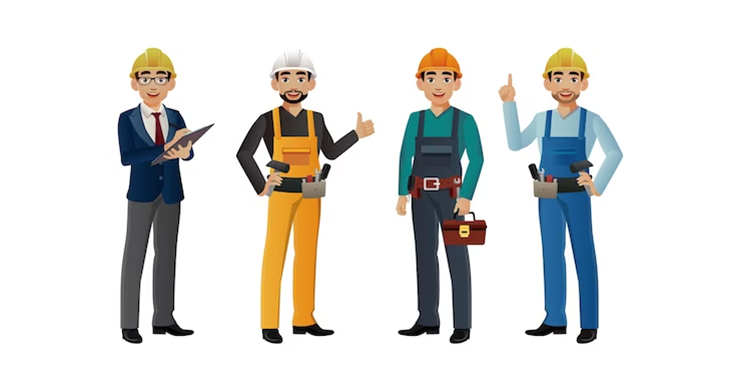
Team awards are a great way to promote collaboration at the workplace and highlight the importance of team effort across the organization.
Here are the key benefits for organizations for including team recognition as part of their employee rewards and recognition programs:
1. Promotes Teamwork and Collaboration
2. Builds Relationships and Mutual Trust
3. Align Workforce to Business Goals
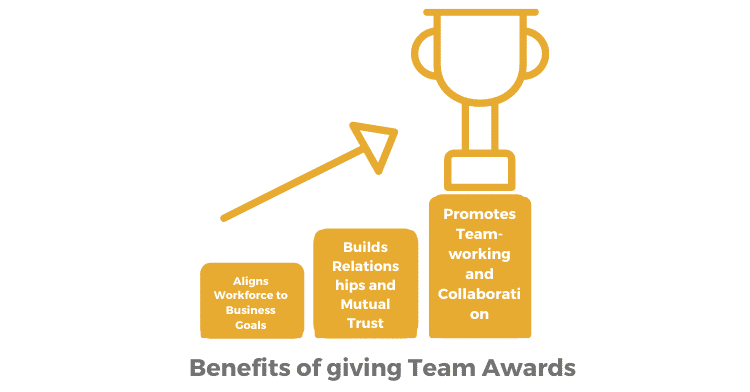

Team Awards are great for encouraging teamwork and collaboration in the workforce, as employees feel motivated to work together towards a common purpose.
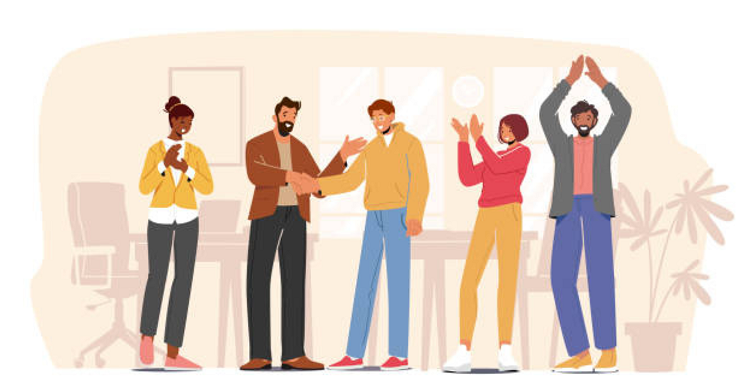
Team recognition help to strengthen relationships between employees and create stronger connections among them.
This helps in building a better work environment.

Recognizing teams for their achievements is also an effective way to align their efforts with the organization’s business goals.

At a global software products company headquartered in the US with offices in multiple countries, leverages the HiFives platform to manage its team awards program.
Project managers can nominate their team for team awards through the platform; team members can also nominate themselves. The nomination request must be approved by the business or practice head before the award is released to the team.
Each team member receives an email with the award e-certificate. They also receive reward points that they can redeem on the platform for e-gift cards of their choice.
Team members may be located in different countries but can receive the same award. They can use the points to receive country-specific e-gift cards.
This system has helped the company reward, recognize, and promote teamwork with minimum administrative overheads.

While including team rewards and recognition in an employee recognition program might seem like a no-brainer, making them effective requires some consideration.
Here are a few best practices that can help enhance the effectiveness of these awards:
1. Choose Team Awards over Individual ones
2. Ensure Fairness while giving the awards
3. Reward Project Teams
4. Reward Cross-Functional Teams
5. Create Visibility for Team Awards
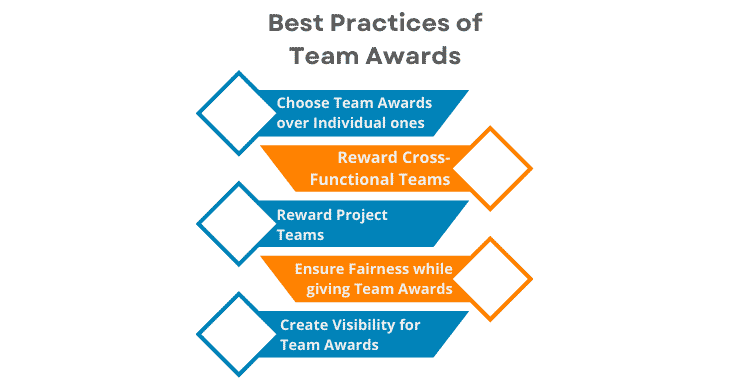

Organizations should look at opportunities to reward and recognize teams over individuals wherever possible.
This will encourage employees to collaborate more effectively to achieve more significant results.

Team members should be chosen based on their contribution to the team’s overall achievements.
Efforts must be made by the organization to include all significant contributors and exclude ‘freeloaders’, even if they might be part of the same function or group.

Rewarding teams that have made significant achievements working on projects, initiatives, or business challenges is a great way to encourage effective teamwork and collaboration.
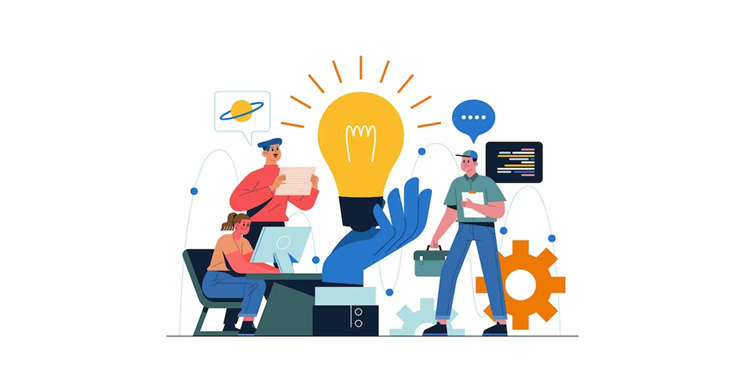
Organizations should look at promoting seamless and cross-functional collaboration by rewarding teams that are working on cross-functional initiatives and special projects across the organization.

Organizations should leverage digital recognition platforms, internal collaboration apps, and external social media integration to communicate team awards effectively.
Virtual or offline forums such as town halls, ‘all hands meet,’ etc., with the presence of the senior management, can also enhance the social visibility of such awards.
Read Comprehensive Guide to Different Types of Employee Awards

While team awards can be effective in recognizing and motivating collective efforts, they also have some drawbacks that organizations should consider:

In a team setting, there’s a risk that individual contributions may be overlooked or undervalued, leading to disengagement among team members who feel their efforts aren’t being recognized.
Team recognition may inadvertently encourage free-riding behavior, where some team members rely on the efforts of others to achieve success without contributing their fair share. This can create resentment and decrease overall team morale.
In larger organizations with multiple teams, disparities in resources, support, and opportunities for recognition may lead to feelings of inequity among teams.
Team awards may fail to inspire or motivate teams effectively if perceived as symbolic gestures or token recognition without meaningful rewards or follow-up actions.
Team Awards can be a powerful tool for organizations to motivate their employees to work together effectively and to build a highly committed and engaged workforce for higher business growth.

Lead author: Sagar Chaudhuri, the Co-Founder and CEO of HiFives. He is an HR Tech Evangelist with over 25 years of corporate and entrepreneurship experience. In the past, Sagar has worked in leadership roles with companies such as Genpact, Infosys, and ICICI Bank. He has an engineering degree from IIT Kharagpur and an MBA from IIM Lucknow. Connect on LinkedIn
To stay updated on the latest HiFives blogs, follow us on Twitter (@MyHiFives)